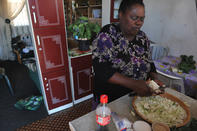A Typical Dinner
Dinner in the Ncani home is nothing fancy tonight: a cup of mealie meal, stirred up in an aluminium pot, its lid pockmarked with wear; a cup of rice; a quarter of a cabbage, chopped into rough chunks; eight spinach leaves, well rinsed under the tap to wash off the sand; salt, Oxo and a splash of sunflower oil.

It bloats up slowly over the two-plate tabletop stove next to the sink in the kitchen corner, with its single tap jutting out from a brass pipe which angles out of the raw plastered wall. Imifino, an all-time favourite. Good old-fashioned Xhosa fare. Linah stirs up the stiff porridge while the stars in some or other soapie spar from a corner in her lounge.
Her son, Sibabalo wolfs down the leftovers from a soup kitchen handout, his spoon working through the Tupperware dish of chicken, rice and vegetables. After he dashes out to play in the street, Linah sits down to an ample helping of the savoury pap. Later, she squeezes a droplet of blood from an invisible puncture on her middle finger, splashing it onto a strip of plastic sticking out like a tongue from a glucose meter.
Keeping an eye on her blood sugar, she says. She has her diabetes under control, taking tablets daily – she is not on insulin shots yet – but admits she sometimes does not take the medication in the morning because she does not get around to eating breakfast. The vegetables she bought for today’s dinner come from the local Usave, part of the Shoprite stable. There is a Pick n Pay nearby, too, but although the food is fresher at Pick n Pay, Usave is cheaper. Cheaper is better.
Battling the City over Water Delivery
Linah spends most of her day working with the HIV positive people in the community, but tackling the stigma about HIV is not Linah’s only battle here in Witsand. The township is a cluster of relatively new RDP houses in amongst the older shacklands that sprang up here on the ancient dune fields on the outskirts of Atlantis after mostly Xhosa-speaking people from the Eastern Cape started moving to the factories in this once burgeoning industrial zone.
The residents of Witsand are in a running battle with the City of Cape Town over water delivery, and Linah is one of those at the front of the troops. Before the City of Cape Town started running electricity, water pipes and asphalt-topped roads into the community in 2005, the place was like so many of the slums that typify our urban edges.
It was in the kind of condition that the United Nations uses to describe most slum settlements: communities which typically have ‘inadequate access to safe water; little or no sanitation; poor structural quality of housing; overcrowding; or insecure tenure’. ‘Witsand was very disadvantaged with no roads, lights, houses, toilets were bucket system, and only three taps for the whole community,’ water activist Bulelani Kave told a group at the Cape Town Climate Change hearings in October 2009, organised by the Environmental Monitoring Group. ‘It was just like a desert.’
Then, in 2005, 400 proper houses were built. They were given taps, running toilets and power. Linah was one of those to get onto the shortlist, and in 2006 she got her little semi and the right to paint 14005 beside the door. But in 2008, the city decided to install a new system of water meters that are designed to issue the 350 litres of free water which the state allocates to all South African households daily.
Once that water has ticked its way through the meter, it gets shut off: not another drop until the following day. The idea, according to the city, is to control each household’s allocation of six kilolitres of water each month through a trickle-feed system. The problem, though, is that the pipes feeding water into many of these RDP houses leak like rusty colanders.
So while the house is bleeding the family’s allocated water out into the ground, walls or weeping toilet bowls, the water meters are blindly counting every milli-litre, oblivious to the fact that the people who need it are not always getting it. It then shuts off the water indiscriminately when the 350-litre mark is reached.
Told to Resolve the Problem Themselves
When the community asked the city to fix the leaks, they were told they had to deal with the problem themselves. ‘And you can imagine, if you don’t have the water. ..’ Linah grasps for the English words to explain what she means. ‘... there is this thing, which is called nature, it happens any time.’ Indeed, the call of nature can come at any time, regardless of whether a local municipality’s reticulation system obliges with the dispensing of the next tranche of water or not.
‘And you can imagine the mama moving from the house at one o’clock to relieve herself in the nearby forest. Where’s the dignity? And then what happens, anyone can do something to her because it’s in the middle of the night.’ So Linah and a few others in the community have taken the issue up with the city.
There were a series of meetings between city officials and the Witsanders to try to get to the bottom of the problem and how to resolve it. The Witsand delegation says the municipality needs to explain to the community precisely how these water meters work, and why their water supply even has to be limited in this way.
‘You see, some of the people have backyarders living on their properties and they don’t understand this 350 litres per day.’ With more people per property, the sooner the property will reach its daily limit.